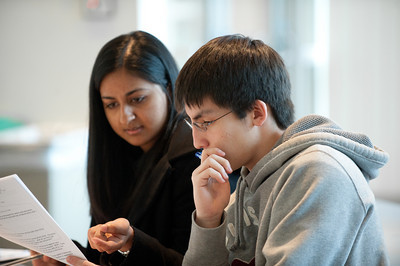About Workshops
The University of Rochester is considered a national leader in the development of the workshop model, an effective, research-supported learning and teaching experience. In this model, students and faculty convene in a cooperative, egalitarian atmosphere that fosters critical thinking.

Workshop Overview
More explicitly, PLTL Workshops are interactive, course-specific problem-solving sessions. Comprised of small teams of students led by a specially trained student facilitator, Workshops meet each week to tackle rigorous material designed to build conceptual understanding and problem-solving skills. Faculty members are closely associated with Workshop activities and their groups of student leaders. These "near peer" leaders are carefully chosen and well trained by faculty and learning specialists in course content, group dynamics, the basics of learning theory, and diversity issues. The credit-bearing leader training program prepares leaders to help their Workshop participants tackle demanding course material together.
Workshop Benefits
Overall, PLTL Workshops provide the added benefit of an enhanced sense of community.
For participating students: Workshops improve learning outcomes and enthusiasm for the subject.
For PLTL Workshop leaders: Workshops provide a valuable leadership experience, a unique opportunity to work with faculty, and greater fluency in the subject.
For faculty: The PLTL Workshop model provides an innovative and collaborative approach to teaching.
For parents: Workshops provide essential learning support for their son or daughter.
Workshop Organization
Workshops are organized through an ongoing partnership between the the Learning Center and a range of departments. Workshops have been implemented with the active participation of faculty in biology, biochemistry, business, chemistry, computer science, economics, electrical engineering, math, nursing, philosophy, and physics.
Download the Center for Workshop Education flyer (pdf).
Did you know...
 Workshops have been most commonly used for large introductory science courses; however, the model can be broadly adapted for courses across the curriculum.
Workshops have been most commonly used for large introductory science courses; however, the model can be broadly adapted for courses across the curriculum.
